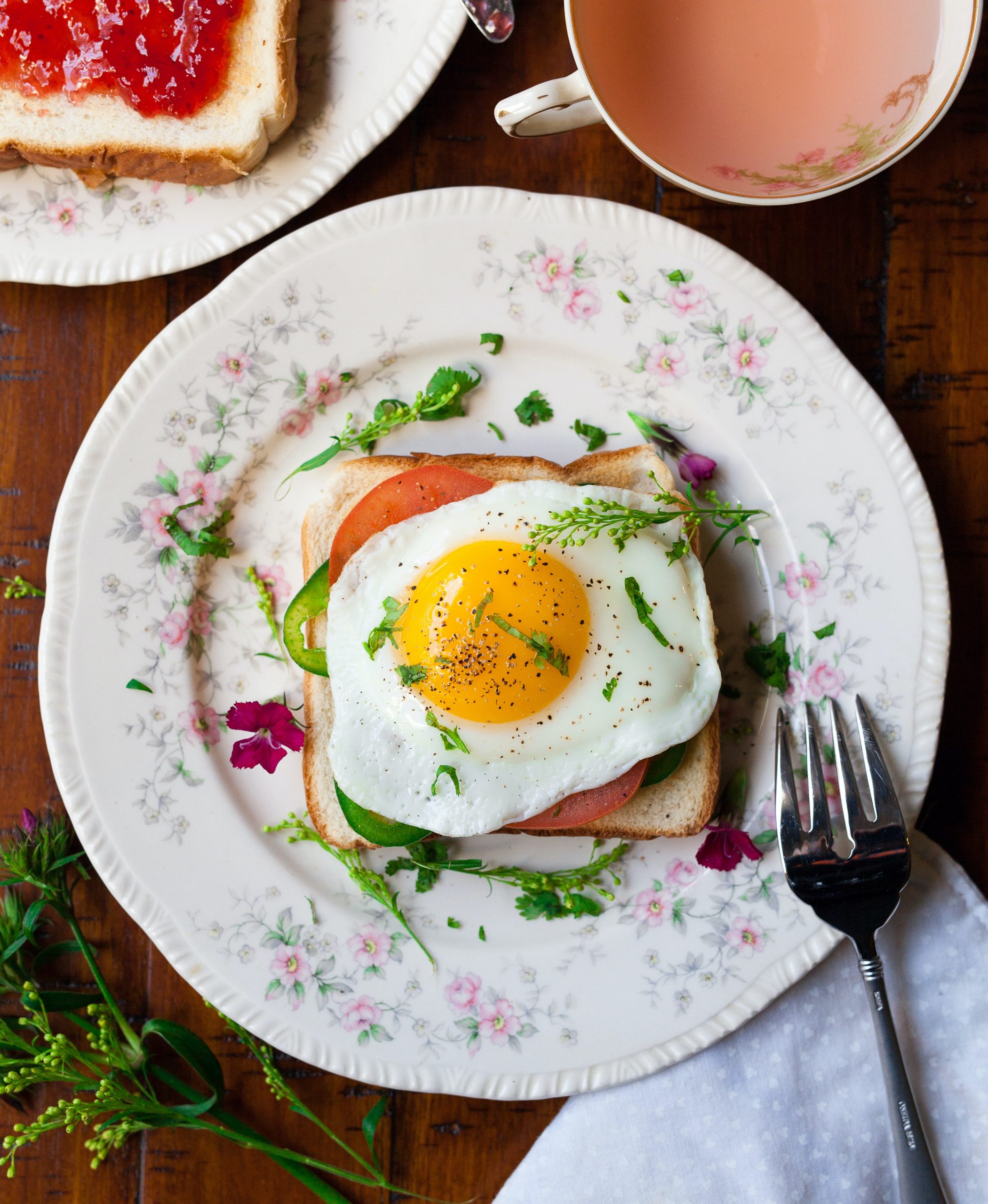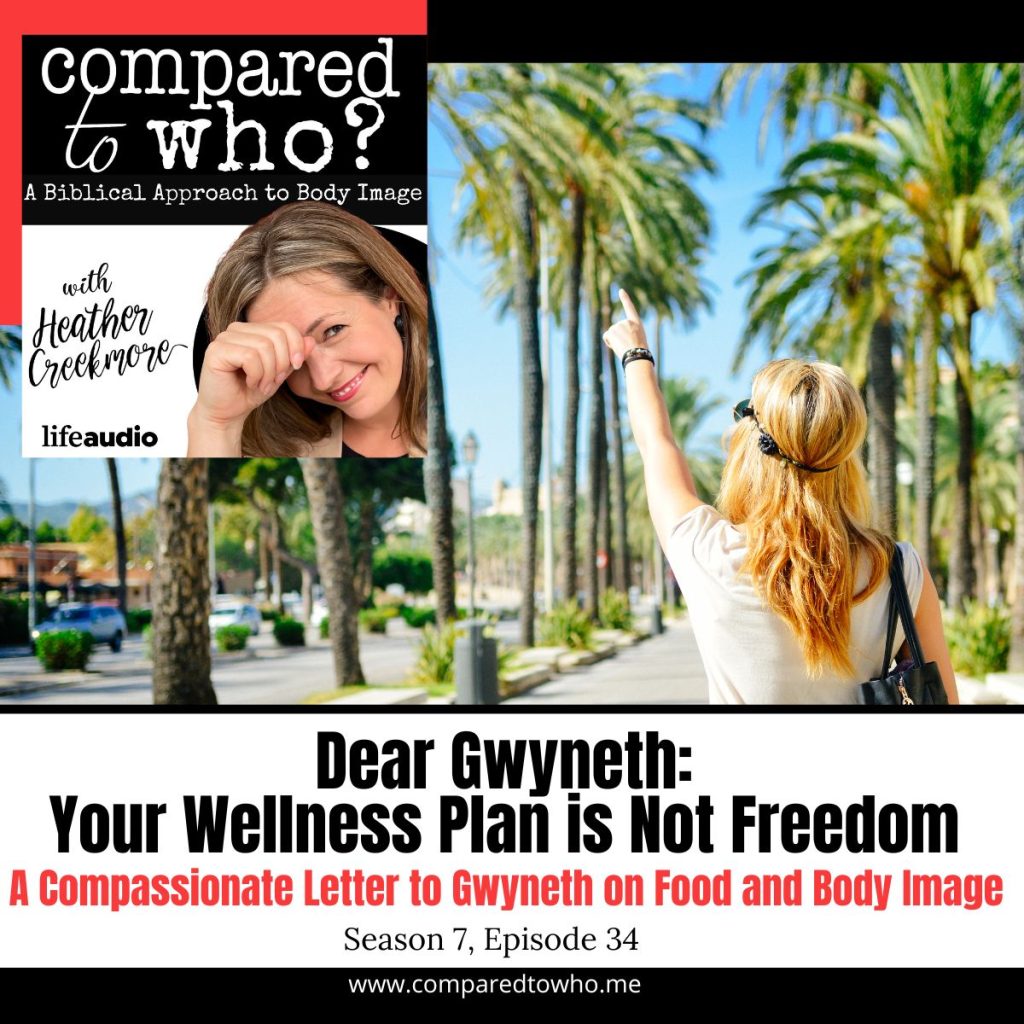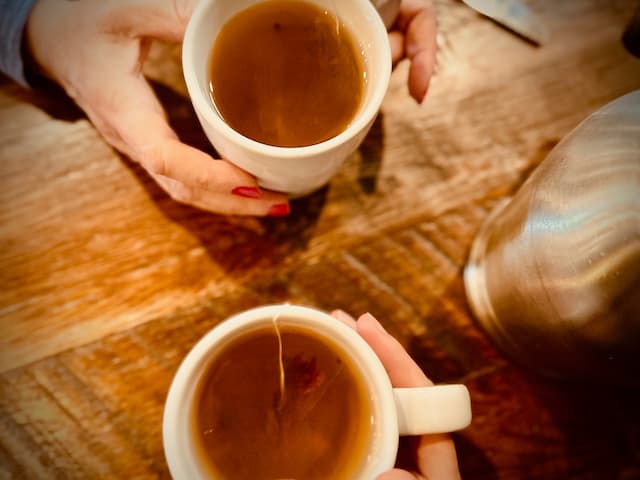Dear Gwyneth: Your Wellness Plan is Not Food or Body Freedom

Today’s episode is a compassionate letter to Gwyneth Paltrow who, on Instagram this week, talked about her “wellness plan” which included her sharing what she eats in a day. If you didn’t get to see the interview, you can learn more in this New York Post article which quipped that Gwyneth’s daily food routine sounded like, “colonoscopy prep.”
But the goal of today’s podcast is not to criticize or condemn Gwyneth. Instead, in this open letter, author and Christian body image coach, Heather Creekmore gently encourages Gwyneth with some data and science to help her see that her “wellness” plan may actually be related to sickness. Heather shares the truth in love with this celebrity who has pressures around her body and appearance that are greater than what most women can understand. Heather shares with Gwyneth some of the data around how dangerous it is to a body to eat this little each day, and how many of the health issues–both mental and physical–that we face as epidemics today–may be connected to starvation diets and calorie restriction.
Gwyneth isn’t a woman who needs more criticism. She’s a woman who needs more love and compassion to help her fight the lies of body image idolatry and disordered eating. Gwyneth’s wellness plan is likely the symptom of damaging beliefs she’s held about her value, body, and food. Let’s pray that she will see the freedom offered through Christ alone.
Find out more about Heather Creekmore, Christian body image coach, and Compared to Who?.
Learn more about the dangers of eating disorders in this interview with a dietitian.
Below you’ll find the entire text of the letter Heather reads on today’s show.
Gwyneth Paltrow Wellness Plan: What I Would Tell Her As a Christian Body Image Coach
Dear Gwyneth –
I see you. I hear you. I feel like I know where you’re at in your relationship with food.
I caught a bit of your wellness interview earlier this week, where you shared your diet—what you eat in a day. And it hurt to hear. It hurt because I related so much to it. Though you didn’t put this label on it, it seems like the theme of your new food plan is “trying not to eat.” I’ve been there. I’ve done the coffee for breakfast, the negative calorie lunch, the gluten-free protein and veggies dinner. I’ve done this while working out an hour a day, like you said you do.
I’d be lying if I didn’t say that I liked how my body felt when I did it. I know you like how it feels too. It’s energizing to eat so little. But, now I know that nothing about that energy is healthy. The buzz is stress hormones coming into help our starving bodies. The buzz is a sense of righteousness over food—as if we’ve finally conquered our bodies’ desire to eat. The buzz is a signal that we’re dangerously undereating.
Gwyneth, I’ve felt that buzz. I liked it too. It was sort of addictive. I’m grateful that my body said enough. My body wouldn’t let me go on like that. It said, “feed me or you won’t function.” With four young children at home, I had to choose functioning.
But you’re under pressures I could never imagine. As a celebrity, people are always watching your body, always photographing your body. You’ve made your mark on the world as a tall, svelte, thin and beautiful woman. For that body size or shape to change would draw criticism from the tabloids. You do not have the same freedom to age and have your body change shape as I do. I mean, you should have that freedom, but because of the way our culture glorifies thin bodied celebrities and classifies any change in body size as “unhealthy”—you are trapped in ways I couldn’t even imagine.
You see, I don’t think your limited daily diet is really about food. Most of us like food. Food is fun. Food tastes good—well, maybe not that bone broth you drink—some if that is nasty. But, food makes us feel good. Our blood sugar rises when we eat to help us feel stable—to help us feel safe.
Food is only the enemy when we believe that it will negatively affect our body size or shape. Food is only the enemy when our body size or shape is so important to us that we’re willing to sacrifice food to save it.
But, Gwyneth, I pray you see how dangerous this is. Our bodies were designed to live on food. The nutrients from foods of all varieties—even carbohydrates—are how our bodies sustain themselves. When our caloric intake drops below 1500 calories a day – basic systems like our reproductive systems stop. I lost my period for almost a year because I didn’t have enough calories to fuel this system. I’m grateful that it came back, but I know many women who have chased a thin body, lost their periods, and struggle to get them back. They determine they want a baby but then struggle with infertility. I can’t help but wonder if teaching our daughters to eat (or not eat) in this way so that they can have a certain body shape or size is damaging a whole generation of girls who may want to have children some day.
On less than 1500 calories a day (and your diet sounds closer to 1200), we feel more anxious, dizzy, and we can even become pre-occupied with food. Honestly, I don’t know how you’re not thinking about food all of the time. When I was in my eating disorder days, it was all I thought about. It feels weird now to have that mental space back. It feels strange now not to think about food all of the time because I thought everyone did.
If you don’t believe me, there’s some fascinating science out there to back this up. One gem from decades ago is the Minnesota Starvation Experiment. This study was conducted on men – healthy young men who were conscientious objectors in World War II. They were monitored for a few months to ensure they were mentally and physically healthy. They were eating around 3,200 calories a day. Then, their diets were radically altered—their calories were cut way low—to 1500 calories. Notice – this was a starvation experiment, and that was the number. What happened to the men was unbelievable. They experienced depression and hysteria. They started talking and dreaming out food. They were sneaking and stealing food out of trash cans and they started reading cookbooks for the pictures (now they call that food porn) and buying kitchen gadgets. There is a 50-chapter report on all the effects that were observed.
Even after the men were brought back to a rehabilitative calorie amount, their side effects didn’t vanish. They still had little interest in sex, greater feelings of guilt around food, and anxiety and depression. In other words—eating that little really messed them up!
When the researchers eventually allowed the men to go back to eating whatever they wanted—some ate up to 11,000 calories a day. Their bodies demanded to be re-fed and their relationship with food continued to be abnormal because of the body’s underlying fear that food would be taken away from them again.
This is just one of the numerous studies out there that show that restricting food and eating about the same number of calories (or more calories) than you consume in a day can be very dangerous. In fact, studies show that 95% of those who lose weight by restricting calories on a diet will regain it within 5 years.
The 5 percent? I’m not a scientist or a dietitian – but my bet is they kept it off because they developed an eating disorder.
Gwyneth – I’m sure you know that eating disorders aren’t a game. They’re the second biggest killer—behind opioid addiction—in the mental health category. Girls and boys, women and men, are hospitalized and losing their lives because of recommendations to eat like you do. I’m confident your heart is not to hurt anyone. But, you need to know that your diet recommendations have tremendous power. Power that can change the way a young girl eats and set her down a dangerous course. When I was a teen, I studied the diets of my favorite celebrities and tried to eat like they did. Of course, I only had magazines to read or I had to catch the right episode of Entertainment Tonight to find out how they ate—there wasn’t any social media post I could watch and re-watch until I got it all down. But things are different now. Our power as influencers is far more dramatic than ever before in history.
But let’s go back to the heart of this. We’re not free around food because we’re not free in our bodies. We’re not free to eat because we believe that what we eat – every morsel – makes our bodies look or behave a certain way. There’s some truth in that, but it’s not the whole story. Women in larger bodies who have atypical anorexia is a growing category. You cannot look at someone and tell how they eat. Trauma, hormones, live experience, health issues—there are many factors at play when it comes to how our bodies look and what size we wear. Some women seem to have more power to manipulate their body size and shape, while others do not. But, manipulating body size through restricting food isn’t wellness—it’s sickness.
I don’t know what your body image journey has been, Gwyneth. I don’t know if you ever struggle or had family members who struggled to accept their body size. I remember you wearing a fat suit in the movie Shallow Hal. I wonder what kind of messages seeped into your soul during that experiment. Did you make a vow to yourself that you’d never get bigger, lest you face the shame and condemnation that came with that size of body in that movie? Does having a bigger body feel scary?
As a Christian body image coach, I understand how you’d feel this way. I look back at pictures of myself from my eating disorder days and I know if that “me” could see me today, she’d be disturbed. I was never supposed to let my weight rise or, as I would say it, “get out of control.” I was supposed to use every method I knew to make sure I wouldn’t be a victim of my body’s desire to change. That was a part of my sickness. I look back at those old pictures and see a very thin woman who thought she was fat. I also see a woman who was constantly thinking about and stressing over food and her body. She didn’t’ have a lot of mental capacity for anything else. Body maintenance, body change, body improvement were secretly my biggest goals. That’s what the sickness does to you. That’s how the eating disorder operates. If God hadn’t interrupted my journey—I’d likely be following your “wellness” plan starting this week.
But, He did. God stopped me and showed me that I had made my body size an idol. It’s easy to see now that I can take a few steps back from it. Our culture sets up these figures—idols—of what we should look like in our skin—and then promises are attached to these idols. If you get a body like Kim’s—then you’ll have wealth or happiness . . . If you get a body like Taylor’s —then you’ll have success . . . If you get a body like Gwyneth’s…then you’ll have health.
But idols don’t deliver. As a Christian, I know they don’t deliver because Jesus is the only one who can truly save me from the misery of this life. Jesus is the only one who can answer my earthly struggles with peace and security. He’s the only way to true life.
While the idols scream—do whatever it takes to look like me so you’ll have the life you’ve always dreamt of—we know this isn’t true. Beautiful women, Hollywood stars whom most of us would give anything to look like—still get dumped, cheated on, fired, depressed, and despairing.Having the right size or shape of body doesn’t really save us from life’s struggle. Instead, for some, it may even make the struggle worse.
And, then there’s midlife. Gwyneth- you’re just a few years ahead of me—I see your 50 years old. Aging is hard on women, but I can only imagine it’s harder on you as a celebrity. Celebrities aren’t supposed to age. I’m proud of you for taking a stand and not being afraid to let the signs of aging show sometimes. I’ve seen your make-up free selfies. Thanks for not buying the lie that women are not supposed to show signs of aging on their face. Even with all the right products—looking older is normal. Staying frozen in the same face you had at 30 is not.
But, with aging comes body changes too. I wonder if that’s the scarier part of aging for you, Gwyneth? Is that what you’re battling now? Peri-menopause – or as some call it—the second puberty—rocks our bodies the same way our ten or eleven-year-old selves were startled by widening hips and budding breasts. I wonder why our culture fights midlife body changes so hard. We’d never tell a twelve year old girl to fight what’s happening to her body. We’d tell her it’s normal. And, yet, my Instagram feed is filled with ads on how to stop my body from aging. I’m supposed to hack my hormones so I don’t look like I’m going through peri-menopause. Something about that seems odd to me.
Gwyneth-I don’t know if you’ll ever listen to this episode and hear my ramblings. But, I pray you do.
Your body deserves to eat.
You do not have to starve yourself to stay thin for us, the crowd, the fans, the elusive ocean of public opinion that will critique and condemn one day, and praise you the next.
I hope you’ll get some help to have a healthier relationship with food.
Because, food is not scary. It’s just food. It doesn’t have the power we were taught by the diet companies that it does.
And more so, your value is not tied to your body staying a certain size.
You are loved by a God who sees and knows every part of you. He isn’t ashamed of you when you restrict food—but He longs for you to know freedom. He longs for you to know that He’s the only one who can truly save you. Having a better body, having optimal health—these things will never save us or set us free. Only Jesus can do that.
Love,
Heather





